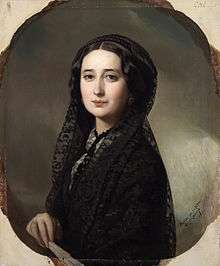Carolina Coronado
Victoria Carolina Coronado y Romero de Tejada (December 12, 1820 – January 15, 1911) was a Spanish author considered the equivalent of contemporary Romantic authors like Rosalía de Castro.
Carolina Coronado | |
|---|---|
 Carolina Coronado | |
| Born | Victoria Carolina Coronado y Romero de Tejada December 12, 1820 Almendralejo, Spain |
| Died | January 15, 1911 Lisbon, Portugal |
| Occupation | writer, poet |
| Nationality | Spanish |
| Genre | Romanticism |
| Spouse | Horacio Justo Perry |
| Partner | Alberto |
| Children | 3 |
| Relatives | Ramón Gómez de la Serna |
Youth
Victoria Carolina Coronado y Romero de Tejada was born on 12 December 1820 in Almendralejo, Badajoz in the province of Extremadura. She was the daughter of Nicolás Coronado y Gallardo and María Antonia Romero de Tejada y Falcón. Her family was well-to-do, but they adhered to a progressive ideology that caused her father and grandfather to be persecuted. After moving to the provincial capital of Badajoz, Carolina received the formal education for girls of her time: fashion and housework. Despite this, she demonstrated at an early age an interest in literature, and she began to read works from widely varying genres. She was self taught in reading and writing and continued her studies despite the criticism of her family. Thanks to this activity she gained a natural ability to compose verses. Her lines were spontaneous and charged with feeling. Many of her poems were based on impossible loves. Her most notable subject was Alberto - who may not even have existed.
Her romantic temperament could also have been influenced by the chronic catalepsy from which she suffered. She even appeared to "die" on several occasions, leading her to interest with the theme of death. She would eventually embalm her deceased husband.
Life in Madrid
After taking a vow of abstinence after the death of Alberto Tejada at sea (whether he was real or imaginary), she revoked the vow when she married sir Horacio Justo Perry in Madrid in 1852. Perry was the secretary of the American embassy.
Coronado had a revolutionary spirit, and she became famous while living in Madrid for the literary salons she held, a group that was called the Hermandad Lírica. Her gatherings served as a meeting-point for progressive writers and a refuge for the persecuted, including many of the most well-known authors of the time. Unfortunately for her, her clandestine refuge and affinity for revolution brought about the disapproval of her contemporaries.
Despite this, she succeeded in publishing several works in newspapers and magazines and thus gained a certain measure of fame. Her physical beauty undoubtedly contributed to her success, and it caused infamous admiration in other romantic writers, including poet Jose de Espronceda.
Coronado died in Lisbon, Portugal on 15 January 1911.
Work
The main body of Coronado's work was lyric poetry. Her poems adopted diverse themes, including patriotic sentiment in ¡Oh, mi España!; religion in El amor de los amores and ¿Cómo, Señor, no he de tenerte miedo?; and especially Romanticism in poems such as A una gota de rocío, A la rosa blanca, Nada resta de tí, ¡Oh! cuál te adoro, A una estrella, and A las nubes. An important theme in her work is her feminism and her strong denunciations of social injustices and violence towards women. Her prolific works were compiled in a single volume entitled Poesías, published in 1843 and re-edited in 1852, that includes a prologue by Juan Eugenio Hartzenbusch.
In prose, she wrote a total of fifteen novels including Luz, El bonete de San Ramón, La Siega, Jarrilla, La rueda de la desgracia (1873), and Paquita (1850). Many critics consider the last to be the best. She also authored several plays like El cuadro de la esperanza (1846), Alfonso IV de León, Un alcalde de monterilla, and El divino Figueroa, but these endeavors are considered minor in comparison to her non-theatrical works.